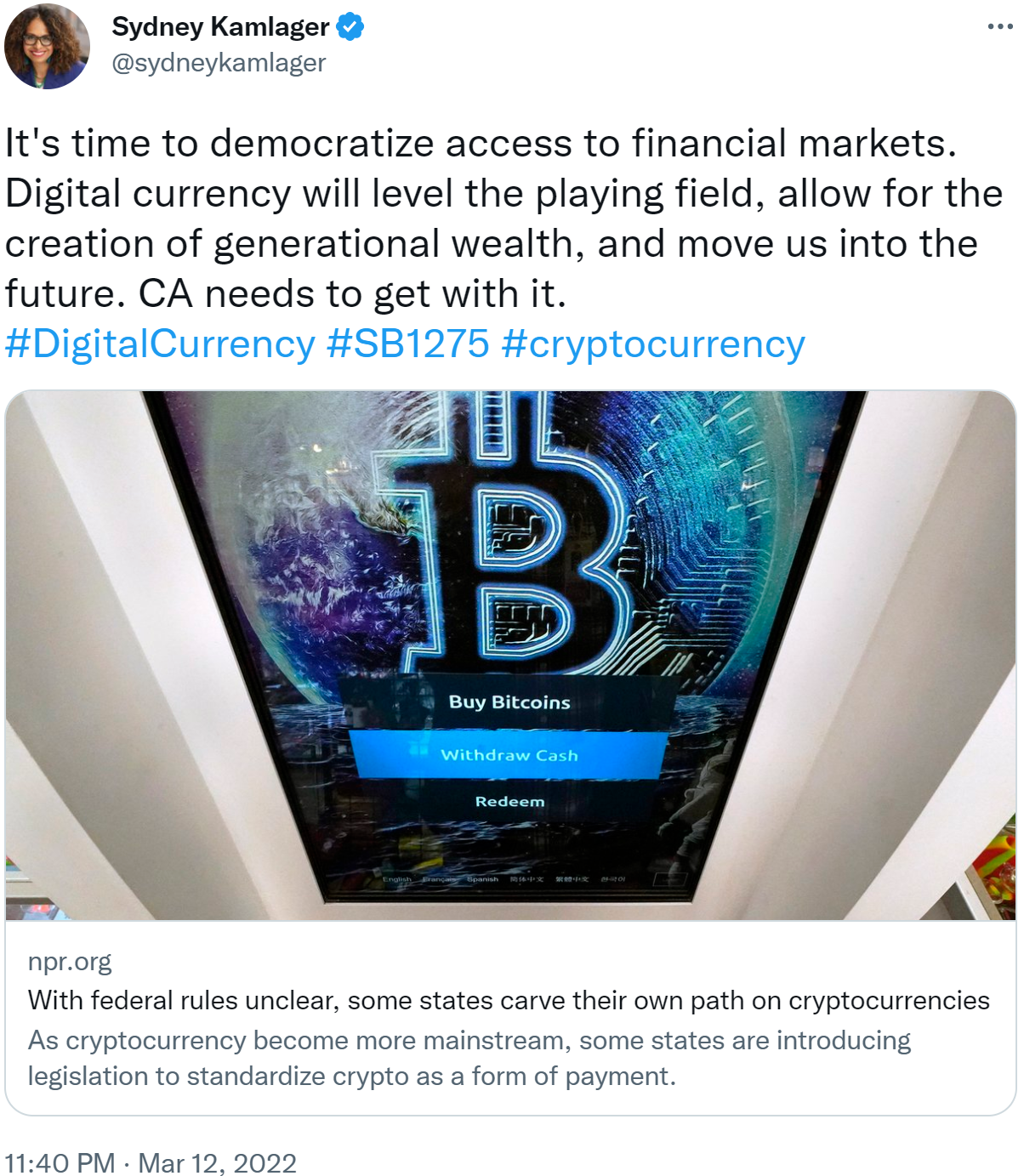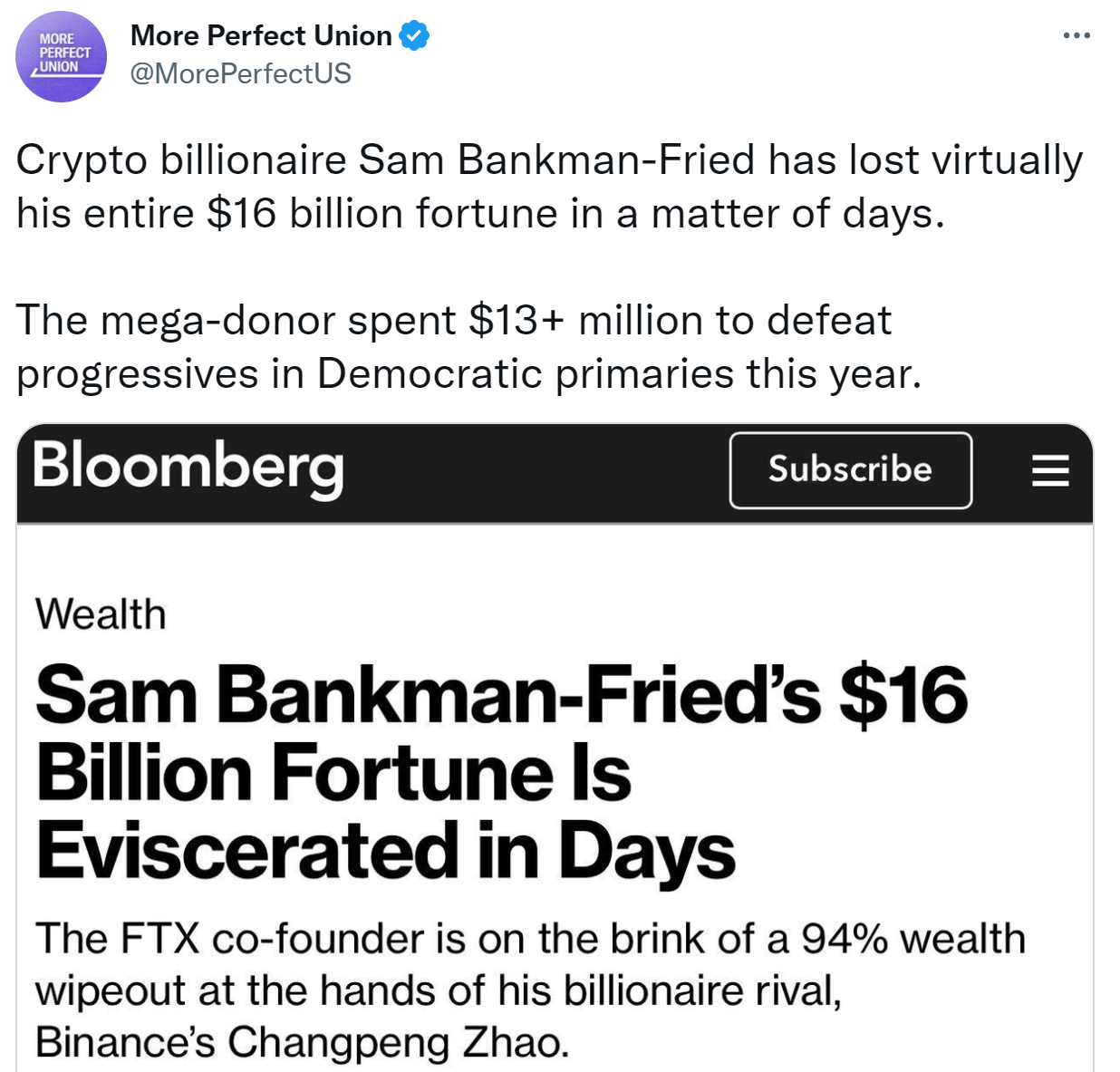TLDR; The Effective Altruism-linked political fund, Protect Our Future, has come under scrutiny for perceived cryptocurrency lobbying. Skip to section Irregularities to see the findings of my investigation into the group.
Background
The effective altruism movement has become increasingly interested and involved in politics. A major vehicle for this involvement has been Protect Our Future PAC (POF), a political fund active in the recent 2022 US midterm elections. The fund ostensibly sought to lobby for effective altruist cause areas, with a particular emphasis on longtermism and pandemic prevention.
POF entered the electoral scene with a bang funding the campaign of Effective Altruist Carrick Flynn to the tune of $10 million. The fund proceeded to donate to 27 candidates in total, exclusively in the Democratic Primaries.
In total POF raised and spent $28 million, nearly all of this coming from Sam Bankman-Fried (SBF) the cryptocurrency tycoon. Despite SBF's financial support, POF has repeatedly denied the fund served SBF's financial interests in cryptocurrency.
Irregularities
As a result of my interest in POF, I proceeded to research and investigate the group and have discovered what to me are irregularities.
I reached out to the President (Michael Sadowsky) and Press Spokesman (Mike Levine) of Protect Our Future, urging them to provide an explanation, but received no response. My inquiry can be viewed here.
Cryptocurrency Interests Amongst Candidates

Of the 27 endorsed candidates I have been able to link 16 as having meaningful pro-cryptocurrency sentiment and/or committee positions that would make them target-worthy by cryptocurrency lobbyists.
A selection of candidates and their ties are presented here. A full table of all candidates endorsed by POF is available in the appendix.
| POF Candidate | Crypto Sympathies/ Conflict of Interest |
| Abigail Spanberger (VA-07) | Rep. Spanberger sits on the subcommittee which oversees the CFTC. https://zappermint.com/craziest-crypto-hearing-ever-heres-what-went-down/ https://www.washingtonexaminer.com/policy/economy/sec-official-steps-down-ftx-connection |
| Adam Hollier (MI-13) | Received donations from Web3Forward PAC, a cryptocurrency lobbying group - $412K https://www.fec.gov/data/committee/C00804187/?tab=spending |
| Alderman Gilbert Villegas (IL-03) | Expressed pro-cryptocurrency sentiments as an alderman. https://www.facebook.com/AldermanGilbertVillegas/posts/pfbid0HAS795MoEtyCGFpZSezxbqh6LjB4ff1yT1D446zXeWke1MahCZpDWCgFV6wSDCfsl |
The presence of cryptocurrency advocates amongst POF's endorsed candidates was also picked up by the press:
The Bankman-Frieds have insisted the organizations are focused on pandemic preparedness and aren’t about influencing cryptocurrency policy. But endorsed candidates are sometimes major supporters of the crypto sector. Lafazan, for example, said back in June he would take campaign donations in cryptocurrency and said he would file a bill in the Nassau County Legislature to create a cryptocurrency task force. Torres, too, who won support from Guarding Against Pandemics, has also publicly boosted the industry.
Ray La Raja, a political scientist who studies campaign finance at the University of Massachusetts – Amherst, says it’s likely no coincidence that Protect Our Future’s funds have gone to establishment candidates at a time when Congress is considering cryptocurrency regulations.
- https://www.theassemblync.com/politics/elections/buying-a-blue-seat-4th-district/
One, Maxwell Frost, a Florida Democrat who has become well known as the first Gen-Z member of Congress, got $8,700 in contributions from the Bankman-Fried brothers and nearly $1 million in help from Protect Our Future, almost all of it after announcing a “crypto-advisory council” for his campaign.
- https://nymag.com/intelligencer/2022/12/sam-bankman-fried-and-sean-mcelwees-fateful-alliance.html
Opportunity For Tommorrow PAC
There is also another fund that appears to have close ties to Protect Our Future called Opportunity For Tomorrow. The fund was exclusively donated to by SBF, and share's the same registered address as POF and the same treasurer.
It gave to 4 candidates, 3 of them having made pro-cryptocurrency statements, and the other, Hickenlooper, has urged regulation by the SEC (and critical of Gensler) which is desired by many cryptocurrency advocates (including SBF) and opposed by cryptocurrency skeptics (typically supportive of Gensler).
I reached POF for comment on these matters but received no reply.
Personnel Issues and Preceived Conflicts of Interest
A central figure in POF's election strategy was pollster Sean McElwee, who himself was an effective altruist, and whose company DataForProgress was paid by POF to conduct polling. McElwee has recently been ousted from Data For Progress for "allegedly pressuring an employee into being a straw donor for Democratic causes" (NYMag) and the perception he was gambling on election outcomes using the firm's polling. He was also made a member of Maxwell Frost's crypto-advisory council, a candidate who POF endorsed at the very behest of McElwee himself.
I asked POF's leaders if McElwee's involvement may explain some of POF's perceived cryptocurrency lobbying since although SBF was not supposed to be influencing, it sounds like McElwee was very aligned with SBF anyway.
I also asked POF if there were any perceived conflicts of interest arising from Sadowsky and Levine's workplaces at Blue Rose Research or TSD Communications (for example were any POF-endorsed candidates also clients of Blue Rose Research).
Pandemic Lobbying Strategy
I personally found POF's lobbying strategy perplexing as the most effective lobbying effort to push Biden's pandemic plan would have been to help Democrats defeat Republicans in the general, yet POF PAC was exclusively active in Democratic primary races, pitting Democrats against Democrats.
Additionally, POF appears to have had a strategy to support incumbents in safe Democratic seats, and not necessarily candidates with the strongest pandemic prevention platform.
"If there’s a theme, it’s SBF spent on races that would be Dem blowouts, picking likely winners rather than edge cases"
Other effective altruists have also expressed concern about POF's unclear strategy and endorsement choices: https://forum.effectivealtruism.org/posts/NRa7ndwZ6kmtJXKqx/ea-aligned-political-activity-in-a-us-congressional-primary
Progressive groups also have the impression they were targeted against by SBF's political activities, a claim that to me appears correct (full disclosure: I was a phone-banking volunteer for the Bernie Sanders campaign in 2020). https://maxberger.substack.com/p/sbf-and-the-injustice-democrats. Note that Max Berger's analysis captures other parts of SBF's political activity, not just Protect Our Future.
In my inquiry to POF, I asked if POF did favour conservative Democratic candidates. I find this odd if this is the case, as typically left-wing candidates were most supportive of pandemic prevention and least resistant to government spending.

Appendix
Full list of candidates and cryptocurrency ties
POF candidates with meaningful pro-cryptocurrency sentiment and/or committee positions that make targetworthy of influence by the cryptocurrency lobby.
| POF Candidate | Crypto Sympathies/ Conflict of Interest |
| Abigail Spanberger (VA-07) | Rep. Spanberger sits on the subcommittee which oversees the CFTC. https://zappermint.com/craziest-crypto-hearing-ever-heres-what-went-down/ https://www.washingtonexaminer.com/policy/economy/sec-official-steps-down-ftx-connection |
| Adam Hollier (MI-13) | Received donations from Web3Forward PAC, a cryptocurrency lobbying group - $412K https://www.fec.gov/data/committee/C00804187/?tab=spending |
| Alderman Gilbert Villegas (IL-03) | Expressed pro-cryptocurrency sentiments as an alderman. https://www.facebook.com/AldermanGilbertVillegas/posts/pfbid0HAS795MoEtyCGFpZSezxbqh6LjB4ff1yT1D446zXeWke1MahCZpDWCgFV6wSDCfsl |
| Anthony Delgado (NY Lt. Governor) | Like Rep. Spanberger, sits on the subcommittee which oversees the CFTC. https://www.washingtonexaminer.com/policy/economy/sec-official-steps-down-ftx-connection |
| Becca Balint (VT-AL) | FTX executive Nishad Singh also donated $1.1 million to Balint via the LGBTQ Victory Fund https://vtdigger.org/2022/11/15/becca-balint-to-donate-2900-contribution-from-crypto-exec-sam-bankman-fried-to-charity/ Light sympathies to Blockchain technology https://www.coindesk.com/markets/2016/05/17/vermont-is-close-to-passing-a-law-that-would-make-blockchain-records-admissible-in-court/ |
| Brittany Pettersen (CO-7) | Received donations from Web3Forward PAC, a cryptocurrency lobbying group - $106K |
| Chuy Garcia (IL-04) | Received donations from Web3Forward PAC, a cryptocurrency lobbying group -$232K Direct donations received by SBF. Sits on the House Financial Services Committee which handles proposales to regulate crypto https://www.politico.com/newsletters/illinois-playbook/2022/12/14/garcias-crypto-conundrum-00073844 Recently urging SEC regulation, and has been critical of FTX post-FTX collapse. https://thehill.com/opinion/congress-blog/3828624-why-we-support-sec-regulation-of-crypto/ |
| Jared Moskowitz (FL-22) | $160K from web3forward |
| Jonathan Jackson (IL-01) | Received donations from Web3Forward PAC, a cryptocurrency lobbying group -$491K |
| Josh Lafazan (NY-03) | Strong supporter of cryptocurrencies, and is accepting donations to campaign via crypto. https://twitter.com/JoshLafazan/status/1508236988675149831?s=20&t=WDr_04eBJ2aJ8FSbqX0R9w Has links to right wing groups. https://theintercept.com/2022/08/18/new-york-primary-joshua-lafazan-crypto/ |
| Maxwell Alejandro Frost (FL-10) | Strong supporter of cryptocurrencies. https://web.archive.org/web/20220428/https://twitter.com/MaxwellFrostFL/status/1519781131603877891 Looking to setup a "Cryptocurrency and Blockchain Advisory Council" https://floridapolitics.com/archives/520117-cd-10-democratic-candidate-maxwell-frost-sets-up-crypto-advisory-council/ |
| Mayor Robert Garcia (CA-42) | Supporter of cryptocurrencies. https://twitter.com/RobertGarcia/status/1502325870870020098 Received donations from Web3Forward PAC, a cryptocurrency lobbying group - $232K |
| Peter Welch (VT-SEN) | Received direct donations from SBF. Listed as a crypto sympathiser by coinbase for co-sponsored a pro-crypto bill RESCUE Act for Black and Community Banks, which includes a provision to conduct a study on blockchain technology and whether such technology could be used to increase investment by lower-income individuals in start-ups and other crowd-funded companies. https://www.coinbase.com/public-policy/legislative-portal/vt/houseOfRepresentatives/6paovrp4CKzqMiLonZNvY1 https://www.congress.gov/bill/117th-congress/house-bill/154/text?r=16&s=1#H2C92C106F3C54DEB8229662B0670F23C |
| Rep. Ritchie Torres (NY-15) | Big supporter of cryptocurrencies. Many positive statements https://www.nydailynews.com/opinion/ny-oped-a-liberal-case-for-cryptocurrency-20220317-n6iaevmh5jeszkpiaqwcog742q-story.html Seeking to subvert SEC's crypto investigation https://prospect.org/power/eight-congressmen-subverting-secs-crypto-investigation/ |
| State Rep. Jasmine Crockett (TX-30) | Largest recepient from web3forward, a cryptocurrency lobbying group - $1.3m. |
| Sydney Kamlager (CA-30) | Strong supporter of cryptocurrency. https://twitter.com/sydneykamlager/status/1502625520931901446 https://cointelegraph.com/news/ca-lawmaker-introduces-legislation-to-accept-crypto-as-payment-for-govt-services Received donations from Web3Forward PAC, a cryptocurrency lobbying group - $41K web3forward |
POF candidates without meaningful pro-cryptocurrency sentiments.
| POF Candidate | Crypto Sympathies/ Conflict of Interest |
| Carrick Flynn (OR-06) | Effective Altruism linked. Has been careful to not comment on crypto |
| Francis Conole (NY- 22) | None apparent |
| Haley Stevens (MI-11) | On committee that engaged lightly with blockhain technologies in 2020. https://www.govinfo.gov/content/pkg/CHRG-116hhrg40870/html/CHRG-116hhrg40870.htm No strong sympathies obvious. |
| Laura Gillen (NY-04) | None apparent |
| Max Rose (NY-11) | None apparent |
| Morgan McGarvey (KY-03) | Voted for a Blockchain Technology Working Group in Kentucky Legislature. But no strong sympathies apparent. https://louisvilleky.gov/metro-council-district-8/document/recapofthelegislativeweek228pdf |
| Nikki Budzinski (IL-13) | Also received money from a super PAC with the same address as POF PAC, Opportunity for Tomorrow PAC. https://www.fec.gov/data/committee/C00811653/?tab=spending |
| Rep. Lucy McBath (GA-07) | None apparent |
| Rep. Shontel Brown (OH-11) | None apparent |
| Robert Menendez (NJ-08) | Embroiled in corruption scandal, but not to do with cryptocurrency https://nymag.com/intelligencer/2017/11/what-is-a-senator-is-a-key-question-in-the-menendez-case.html Appears very critical of cryptocurrency post-FTX collapse. |
| Valerie Foushee (NC-04) | None apparent |




I think you would start this by looking at the base rate among all congresspeople.
That is, looking at "non-FTX funded" how many are have "pro-cryptocurrency views" and "anti cryptocurrency " views.